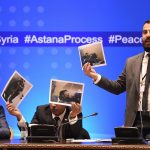RUSSIA MONITOR
Date: 15 September 2017
Israel, Iran and Russia’s double game
Another conflict in the Middle East is likely to occur. Israel may decide to attack Hezbollah as the country is afraid of a strong position of Shiite extremists and their Iranian protector in Syria. Israeli Prime Minister Benjamin Netanyahu has tried to take advantage of his good relations with Vladimir Putin and thus he has counted that Russia would exert pressure on Tehran. On one hand, Moscow pretends to be a friend of Israel but it will depend on its proven allies, namely Iran and Hezbollah.
On September 12, Hezbollah declared its victory in the Syrian war. Actually, Asad’s coalition forces, Shiite militia, as well as Russia and Iran have already made a great progress but it is too early to announce the end of the conflict. Especially given the fact that there are still some battles in eastern Syria. If the government forces defeat so-called Islamic State, Iran will gain a land connection (through Iraq) to its assets in Syria and Lebanon. Such a situation would constitute a black scenario to Israel and that is why the state seeks to prevent it. Generals and politicians have recently implied that they could attack Hezbollah in southern Lebanon without any help. The message has been additionally reinforced with a raid on a government resort in western Syria, where Hezbollah had been armed, and with large military maneuvers in the northern part of the country. Hezbollah and Iran do not want an open conflict as it would draw away their forces from the front in Syria. Also Israel has realised that a war would mean serious losses for the country. Thus, its aim is to stop Iran’s expansion on Russia. At the same time, little is known how Moscow would react if Israel went to war with Hezbollah. On one hand, the Shiites constitute Russian allies in Syria but Moscow also turns a blind eye on Israeli attacks on convoys with weapons for Hezbollah.
During his visit to Moscow in August this year, Benjamin Netanyahu declared that his country was ready to act on its own in order to stop Iran’s expansion into Syria. However, Russia seems to ignore Israeli fears. Soon after the Putin-Netanyahu meeting, Russia’s Foreign Minister Sergey Lavrov rejected the possibility that Iranian presence in Syria could lead to a military confrontation after the end of the war. Moreover, Lavrov dismissed Israeli claims that the country’s interests had not been taken into account during American-Russian negotiations that led to the creation of a “safety zone” in southern Syria. At the same time, the Kremlin has falsely assured Netanyahu that it could influence Iran by some diplomatic means. Such a double game could have been noticed in the course of works on the UN resolution on extending the mandate of United Nations Interim Force in Lebanon (UNIFIL) in Lebanon. Eventually, UNIFIL soldiers were given more tools thanks to which it was easier to respect peace in Lebanon but some passages on a destabilising role of Hezbollah, proposed by the United States and Israel, were deleted from the text of the resolution. Russians threatened that if the passage had been included in the project, they would have vetoed the mandate extension.
All texts published by the Warsaw Institute Foundation may be disseminated on the condition that their origin is credited. Images may not be used without permission.










